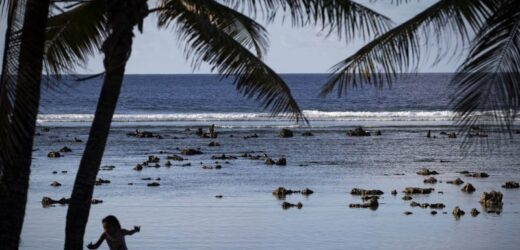Save articles for later
Add articles to your saved list and come back to them any time.
London: Nauru wants permission to mine the ocean floor for critical minerals used to make batteries for the global transition to net zero, saying it would give the tiny Pacific nation the chance of economic survival with the end of offshore processing.
Potato-sized nodules laden with some metals, including cobalt, manganese and nickel, required to make the batteries needed for electric vehicles and green energy systems lay on the sea bed in the Clarion-Clipperton Zone, an area spanning 4.5 million square kilometres between Hawaii and Mexico.
A child plays near the beach in Nauru.Credit: New Zealand Herald
Around 30 countries, including Nauru, were granted exploration contracts by the UN agency that governs deep-sea mining, the International Seabed Authority, in 2011. But since then, there has been no progress on authorising the exploitation of the minerals with the international community divided over the idea.
The Authority is due to meet next week in Jamaica with speculation a decision on granting permission will be delayed again.
Nauru’s Ambassador to the International Permanent Sea Bed Authority Margo Deiye said Nauru’s economic prospects were dwindling with the phasing down of its phosphate mining and offshore processing of Australia’s unwanted asylum seekers.
“We need to diversify, we have more ocean than land,” she said in an interview over Zoom from New York where she is Ambassador to the UN.
Environmental groups want a ban on the potential deep-sea mining of minerals used in green technology like electric car batteries.Credit: AP
Nauru Ocean Resources Inc (NORI), a subsidiary of Canadian mining company The Metals Company, has led efforts to exploit seabed minerals in the Pacific.
Nauru is urging the international community to stop stalling on a decision and allow it to collect the nuggets using robots ahead of the crunch meeting on the issue next on July 9.
At the heart of the discussions is a loophole known as the “two-year rule”, which says the ISA council must “consider and provisionally approve” applications two years after they are submitted, even though it has yet to finalise related regulations. Nauru, TMC’s sponsoring state, triggered the loophole in July 2021.
Nauru has indicated it would submit a “plan of work” to the ISA’s technical committee this year, but the committee is not expected to formally recommend approval.
Next week’s decision is likely to delay any decision on deep-sea mining. Credit: AP
Western countries have expressed alarm at the risks posed by China dominating the supply of critical minerals. But many countries are also deeply opposed to deep-sea mining including Germany, France, Spain, Chile and New Zealand, arguing that it would destroy the underwater ecosystem.
They want a moratorium on all sea bead mining. Environmental groups warn that the use of heavy machinery to extract polymetallic nodules from ocean floors could cause irreparable damage to marine ecosystems, destroying habitats, churning up sediment and disrupting migratory routes.
TMC says that while deep-sea mining will have some ecological impact, it would be less damaging than land-based extraction.
Sian Owen, director of the Deep Sea Conservation Coalition said new technology and recycling could reduce demand for critical minerals by as much as 58 per cent by the middle of the century.
“We are facing a dual crisis of biodiversity loss and climate change,” Owen said.
“One should not be sacrificed to address the other. Deep-sea mining would see industrial extraction on a far greater scale than anything on land.”
Nauru is slowly sinking into the Pacific because of climate change. Deiye said allowing mining for the metals to produce the batteries required to reduce greenhouse gas emissions was a balanced trade-off.
“We need to take our own development into consideration while everyone else emits their greenhouse gases,” she said.
She said the country had a shot of forging its own economic future having suffered the consequences of phosphate mining when colonised. Nauru gained control of its phosphate industry in the 1970s and for a time became one of the wealthiest countries on a per capita basis before verging on bankruptcy when the deposits ran dry.
“We don’t go with this without eyes closed with our eyes open because we’ve had that experience,” she said. “The misunderstanding is that any human activity does not have risks – every activity has risks. “But the risk of not doing anything with this current climate crisis, is much bigger for us and it’s an existential threat for the Pacific.”
She said allowing Nauru to mine was a better solution for the nation than having to beg from richer countries for income.
Nauru earned hundreds of millions of dollars by agreeing to house Australia’s unwanted asylum seekers. Although all asylum seekers have now been removed from the island, Australia will provide $350 million a year to the tiny island.
with Reuters
Get a note directly from our foreign correspondents on what’s making headlines around the world. Sign up for the weekly What in the World newsletter here.
Most Viewed in World
From our partners
Source: Read Full Article





